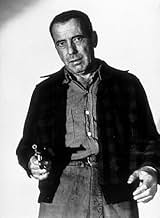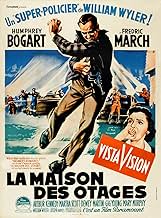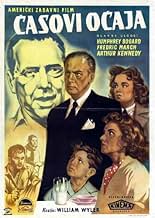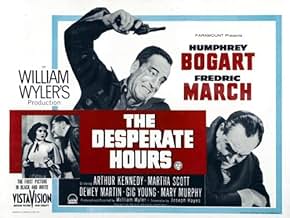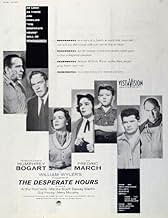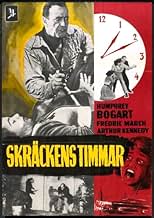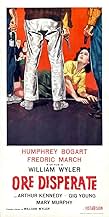IMDb रेटिंग
7.5/10
11 हज़ार
आपकी रेटिंग
अपनी भाषा में प्लॉट जोड़ेंThree escaped convicts move in on and terrorize a suburban household.Three escaped convicts move in on and terrorize a suburban household.Three escaped convicts move in on and terrorize a suburban household.
- पुरस्कार
- 2 जीत और कुल 1 नामांकन
Walter Baldwin
- George Patterson
- (बिना क्रेडिट के)
John Benson
- Bellboy
- (बिना क्रेडिट के)
Paul E. Burns
- Chef at Al's Dining Room
- (बिना क्रेडिट के)
Edmund Cobb
- Mr. Walling
- (बिना क्रेडिट के)
कहानी
क्या आपको पता है
- ट्रिवियाThe character of Glenn Griffin was made older so Humphrey Bogart could play the role. The stage version starred Karl Malden and a young Paul Newman in the Bogart role.
- गूफ़Before Glenn asks Eleanor if she could make a phone call without crying, he puts his left hand in his pocket. When she stands up and walks to the phone, he puts the same hand in the pocket again.
- भाव
[first lines]
[the morning newspaper hits the front door]
Ellie Hilliard: I'll get it, darling.
Daniel Hilliard: [about the newspaper boy's routine of always hitting the front door with the newspaper] Some morning I'm gonna catch up with that kid.
- कनेक्शनFeatured in The Colgate Comedy Hour: एपिसोड #6.3 (1955)
फीचर्ड रिव्यू
Dan Hilliard and his family are perfect Americans, corresponding admirably to the bourgeois ideal. The two children are bright, good-looking and obedient. Cindy is about 20 and is going steady with an attorney who owns a sports car. Ralphy is eight or so, all plaid shirts, jeans and attitude. He has a baseball mitt and a bicycle. Ellie, Dan's wife, runs their spotless home with quiet efficiency. Everything is in its place. Trash collectors call at fixed times. Breakfast is a serene family ritual. The Hilliards' home life is as balanced, as regular and as dull as the barometer on the wall. As for Dan Hillier himself, he has attained that mythic status to which all 1950's bourgeois males aspired - he is an executive. The middle classes don't want adventure in their lives, they want predictability. And this is the perfect, dream-like state in which the Hilliards pass their anodyne existence, secure in their suburban womb - until the American Nightmare is unleashed upon them.
What if members of The Underclass, with their dirty, unshaven physicality and their sagging, torn clothes should irrupt into the suburbs? What if, by some catastrophic failure, the police and the prison service can't keep The Underclass in its designated containers? How will nice folks like the Hilliards cope if confronted by these alien beings?
There has been a jailbreak. The citizens of Indianapolis have been warned to watch out for three desperadoes - the two Griffin brothers and their accomplice Kobish. Little do the Hilliards realise as they go about their tranquil suburban lives, but the fugitives are about to choose the Hilliard home as a place to hole up ...
Like "Suddenly", made a year earlier, this is a 'bad guys invaded my home' movie. The downside of bourgeois affluence is the fear that the disenfranchised masses will come to take away your goodies.
Humphrey Bogart was in his late 50's and clearly ailing when he played the part of Glenn Griffin, the leader of the fugitive trio. He would make only two more films in the short time that was left to him. Dewey Martin, 26 years his junior, plays his kid brother Hal.
More than anything, "The Desperate Hours" is a film about social class. "You can't play ball with savages like that," opines a Madison County detective. Glenn holds his social superiors in equal contempt, calling them "smart-eyed respectable suckers". He warns Hal not to expect any favours from the class enemy: "Guys like Hilliard ever give you a fair shake?" Much play is made of linguistic markers which separate the educated from the rest ('whom' instead of 'who'), and contrasts in table manners between the refined Hilliards and their thuggish captors. Glenn lashes out against the tea tray, that emblem of middle-class gentility, and the virginal Cindy, whom he urges Hal to 'take'.
Dire though the Hilliards' predicament may be, they are not alone. They are exactly the kind of people the forces of law and order exist to protect and serve, and it is not long before Madison County's finest and the FBI are closing in on the fugitives. And the cops have science on their side. They can tap the phone of Glenn's girlfriend in Pittsburgh, and tail her across America as she heads for the rendezvous. In the police station, the humming wires never rest as technology narrows down the bad guys' options.
Middle-class sensibility is all-pervasive. Chuck and Cindy argue near the sports car, but break off abruptly when two people pass by. No matter how deeply the emotions may run, it isn't seemly to fight in front of the neighbours. Dan's secretary can tell, from nuances of his behaviour, that something is very wrong. Similarly, the trashman senses that things are amiss with Ellie by the quality of her chat. We see Cindy admiring her curves in front of the hallway mirror, because it is important that she be sexually desirable (so that the fugitives will regard her as a chattle). Chuck, however, has to remain sexually thwarted, because his behaviour is bound by rigid bourgeois restrictions. We see him raise the arm-rest in his sports car in the hope of a grappling session with Cindy, then lowering it dejectedly when he realises that his luck is out. Dan's wave to Chuck to cross the threshold is a symbolic acceptance of him as a son-in-law. He has made it into The Family.
Light represents goodness. Cindy comes home after another chaste date with Chuck and is bathed in bright light on the doorstep. Dan and Ellie declare their love for each other, their bodies lit intensely in an otherwise black bedroom. The searchlights of the police, and the bad guys' vain attempts to eradicate them, show us figuratively what we yearn to see - that good will always triumph over social disruption.
The overpowering of Ellie, the smashing of Ralphy's toy plane and the collapse of Cindy all happen on the same spot and are all filmed from the same low angle. These dramatic incidents show the Hilliards at bay, and the unusual vantage-point stresses the 'wrongness' of what is happening.
Implausibilities abound throughout the movie. How likely is it that the front door would be left unlocked, that Chuck would reach the house ahead of the cops, or that Dan would insist on carrying a gun, then empty its clip? Why would he hesitate to call the police in, once he got the upper hand? Why would everyone leave the family unattended, moments after the conclusion of a violent and dramatic siege?
And yet it works. Glenn's love of his brother breaks through his tough-guy facade, and after he gives his guns away he undergoes a tragic 'King Lear' moment of self-realisation. These are powerful moments in a powerful film.
What if members of The Underclass, with their dirty, unshaven physicality and their sagging, torn clothes should irrupt into the suburbs? What if, by some catastrophic failure, the police and the prison service can't keep The Underclass in its designated containers? How will nice folks like the Hilliards cope if confronted by these alien beings?
There has been a jailbreak. The citizens of Indianapolis have been warned to watch out for three desperadoes - the two Griffin brothers and their accomplice Kobish. Little do the Hilliards realise as they go about their tranquil suburban lives, but the fugitives are about to choose the Hilliard home as a place to hole up ...
Like "Suddenly", made a year earlier, this is a 'bad guys invaded my home' movie. The downside of bourgeois affluence is the fear that the disenfranchised masses will come to take away your goodies.
Humphrey Bogart was in his late 50's and clearly ailing when he played the part of Glenn Griffin, the leader of the fugitive trio. He would make only two more films in the short time that was left to him. Dewey Martin, 26 years his junior, plays his kid brother Hal.
More than anything, "The Desperate Hours" is a film about social class. "You can't play ball with savages like that," opines a Madison County detective. Glenn holds his social superiors in equal contempt, calling them "smart-eyed respectable suckers". He warns Hal not to expect any favours from the class enemy: "Guys like Hilliard ever give you a fair shake?" Much play is made of linguistic markers which separate the educated from the rest ('whom' instead of 'who'), and contrasts in table manners between the refined Hilliards and their thuggish captors. Glenn lashes out against the tea tray, that emblem of middle-class gentility, and the virginal Cindy, whom he urges Hal to 'take'.
Dire though the Hilliards' predicament may be, they are not alone. They are exactly the kind of people the forces of law and order exist to protect and serve, and it is not long before Madison County's finest and the FBI are closing in on the fugitives. And the cops have science on their side. They can tap the phone of Glenn's girlfriend in Pittsburgh, and tail her across America as she heads for the rendezvous. In the police station, the humming wires never rest as technology narrows down the bad guys' options.
Middle-class sensibility is all-pervasive. Chuck and Cindy argue near the sports car, but break off abruptly when two people pass by. No matter how deeply the emotions may run, it isn't seemly to fight in front of the neighbours. Dan's secretary can tell, from nuances of his behaviour, that something is very wrong. Similarly, the trashman senses that things are amiss with Ellie by the quality of her chat. We see Cindy admiring her curves in front of the hallway mirror, because it is important that she be sexually desirable (so that the fugitives will regard her as a chattle). Chuck, however, has to remain sexually thwarted, because his behaviour is bound by rigid bourgeois restrictions. We see him raise the arm-rest in his sports car in the hope of a grappling session with Cindy, then lowering it dejectedly when he realises that his luck is out. Dan's wave to Chuck to cross the threshold is a symbolic acceptance of him as a son-in-law. He has made it into The Family.
Light represents goodness. Cindy comes home after another chaste date with Chuck and is bathed in bright light on the doorstep. Dan and Ellie declare their love for each other, their bodies lit intensely in an otherwise black bedroom. The searchlights of the police, and the bad guys' vain attempts to eradicate them, show us figuratively what we yearn to see - that good will always triumph over social disruption.
The overpowering of Ellie, the smashing of Ralphy's toy plane and the collapse of Cindy all happen on the same spot and are all filmed from the same low angle. These dramatic incidents show the Hilliards at bay, and the unusual vantage-point stresses the 'wrongness' of what is happening.
Implausibilities abound throughout the movie. How likely is it that the front door would be left unlocked, that Chuck would reach the house ahead of the cops, or that Dan would insist on carrying a gun, then empty its clip? Why would he hesitate to call the police in, once he got the upper hand? Why would everyone leave the family unattended, moments after the conclusion of a violent and dramatic siege?
And yet it works. Glenn's love of his brother breaks through his tough-guy facade, and after he gives his guns away he undergoes a tragic 'King Lear' moment of self-realisation. These are powerful moments in a powerful film.
टॉप पसंद
रेटिंग देने के लिए साइन-इन करें और वैयक्तिकृत सुझावों के लिए वॉचलिस्ट करें
- How long is The Desperate Hours?Alexa द्वारा संचालित
विवरण
- रिलीज़ की तारीख़
- कंट्री ऑफ़ ओरिजिन
- भाषा
- इस रूप में भी जाना जाता है
- Casovi ocaja
- फ़िल्माने की जगहें
- उत्पादन कंपनी
- IMDbPro पर और कंपनी क्रेडिट देखें
बॉक्स ऑफ़िस
- बजट
- $23,88,000(अनुमानित)
- चलने की अवधि1 घंटा 52 मिनट
- रंग
- पक्ष अनुपात
- 1.37 : 1(original ratio)
इस पेज में योगदान दें
किसी बदलाव का सुझाव दें या अनुपलब्ध कॉन्टेंट जोड़ें



